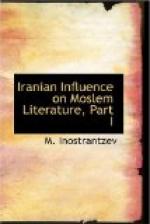Mukaffa and partly from another translator with the
only difference that the anonymous writer is oftener
more concise than Tabari. Again the version which
does not proceed from Ibn Mukaffa is for the most
part in accord with the epitome of the story of the
Sasanides in the introduction to Yakubi’s History
of the Abbasides; there the excellent author occasionally
subjoins extraneous information. More often than
not this presentment is in touch with Ferdausi.
I am unable to aver from whom has originated this other
recension of the story of the Sasanides. We know
indeed the names of a number of persons who redacted
the History of Persia, originally in Pahlavi, for
Arab readers. But though we can collect a few
notices of some of the authors mentioned, we know
nothing in particular about them and are completely
in the dark about the special nature of their work.
All that we can postulate as established is that they
wrote posterior to Ibn Mukaffa. The latter is
always mentioned in the first place. Muhammad
bin Jahm who is regularly cited next after him and
bears the surname of Bermaki, was a client of the
Barmecides, who came to power a long while after the
death of Ibn Mukaffa. Ifc may be supposed that
they all laid under contribution the production of
their celebrated predecessor. How they individually
set about their work, whether perhaps some of them
tapped non-Persian tradition; also, how far one or
other of them utilized the novels of which there were
probably many in Pahlavi—this we are no
longer in a position to determine. Again this
too remains a mystery whence Tabari came by most of
the accounts touching the Persians, which are conspicuous
by their absence in the anonymous Codex. To clear
this whole ground it would appear to be expedient in
the first place to set apart all that for which Ibn
Mukaffa directly or indirectly is responsible.
This I have done in the footnotes but an advance is
possible in this direction. On the other hand,
we must keep Ferdausi steadily before our eyes.
Whatever in Tabari and other Chroniclers does not
issue from Ibn Mukaffa and is not represented in Ferdausi
likewise merits special study.
[Sidenote: Direct Sources of Ferdausi.]
[Sidenote: The Persian prose Shahname was not
derived from Arabic but Pahlavi.]
A superficial reading of Firdausi would engender the
view that he obtained his material partly from Pahlavi
books direct and partly from the oral communication
of competent renconteurs. That this is only a
deceptive illusion we conclude at once from his strong
resemblance not only in the main features but also
in the details and the order, with Arab writers some
of whom were much anterior to him. Firdausi positively
knew no Pahlavi and as for Arabic he knew next to nothing.
He did employ written sources preponderatingly if
not exclusively and these were in modern Persian.
His principal authority was, according to the introduction
mentioned above, a translation of the old Book of Kings




